人教版高中英语必修3 Unit2 Healthy eating Grammar(共32张PPT)
文档属性
| 名称 | 人教版高中英语必修3 Unit2 Healthy eating Grammar(共32张PPT) |
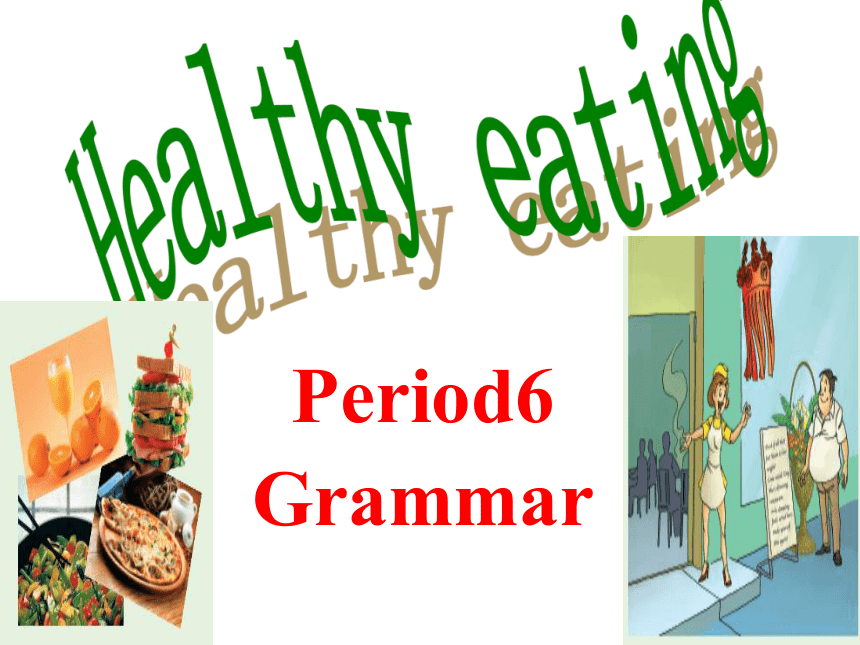
|
|
| 格式 | zip | ||
| 文件大小 | 534.5KB | ||
| 资源类型 | 教案 | ||
| 版本资源 | 人教版(新课程标准) | ||
| 科目 | 英语 | ||
| 更新时间 | 2020-02-25 00:00:00 | ||
图片预览

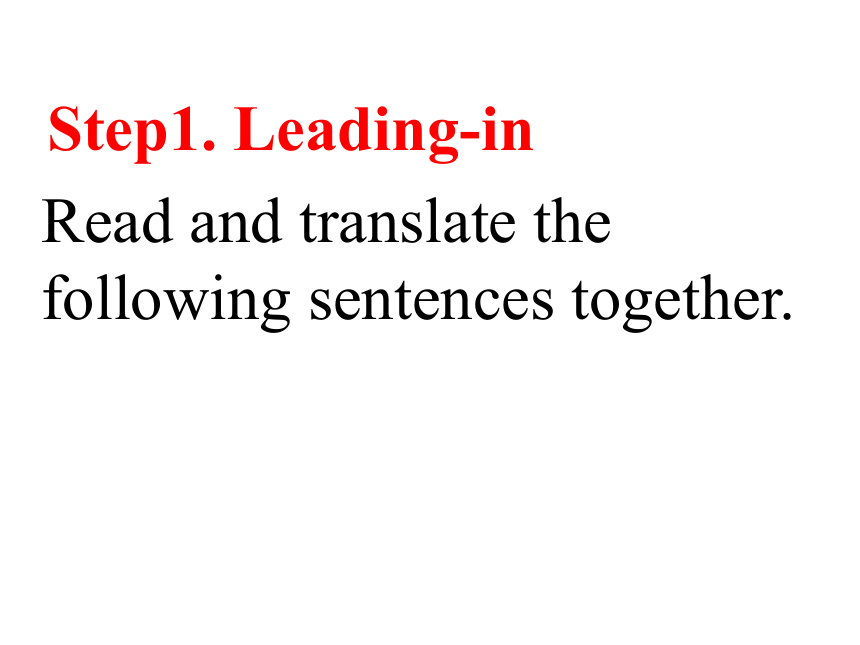
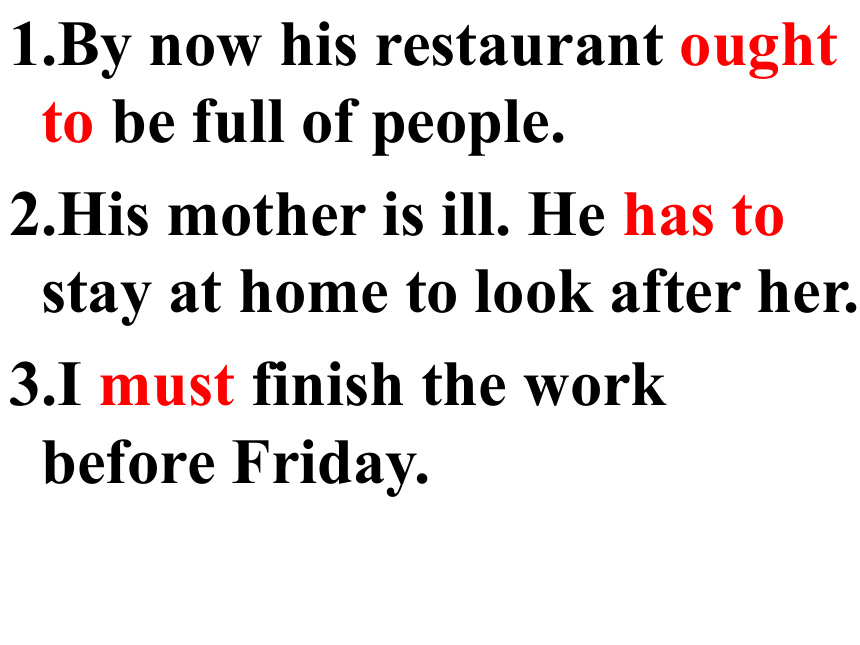
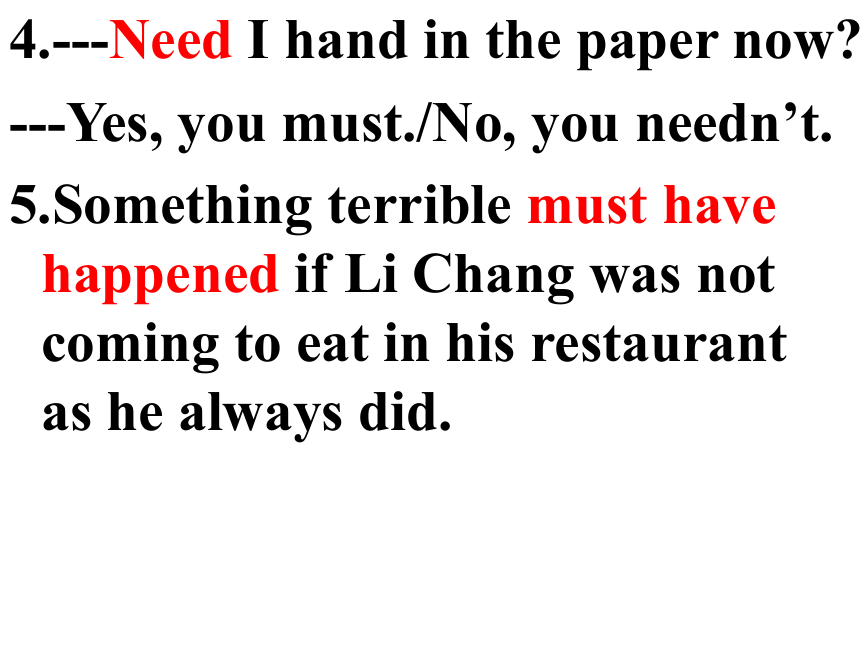
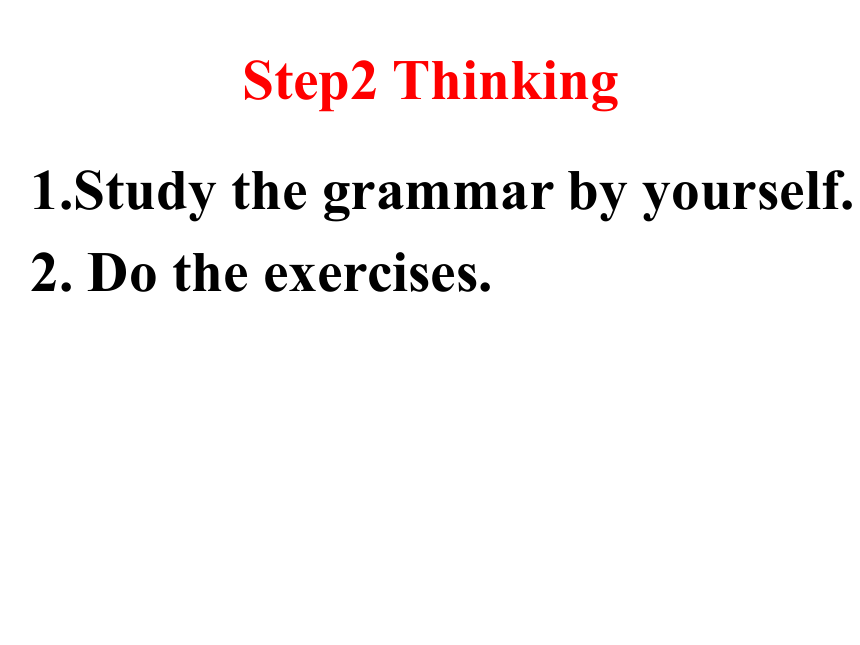
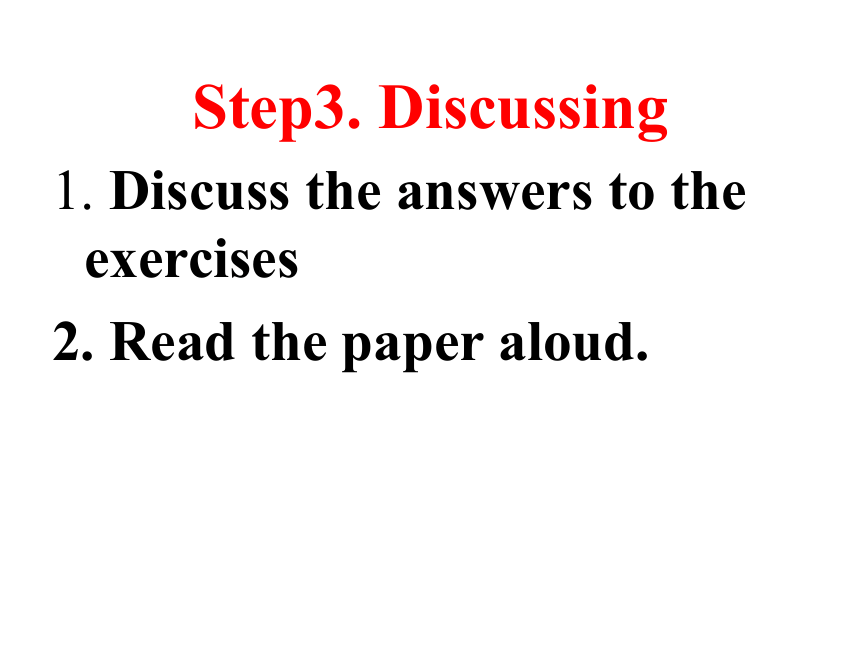
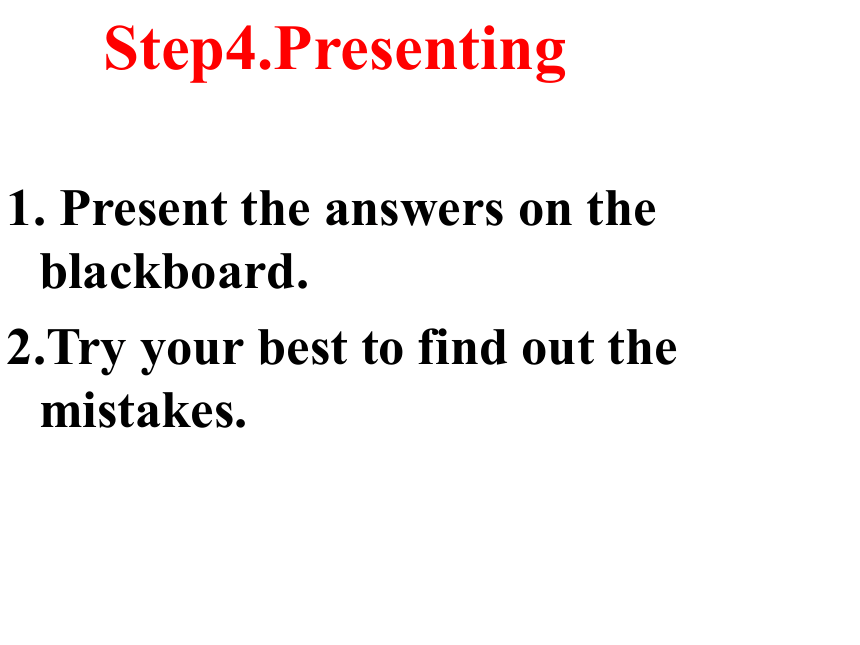
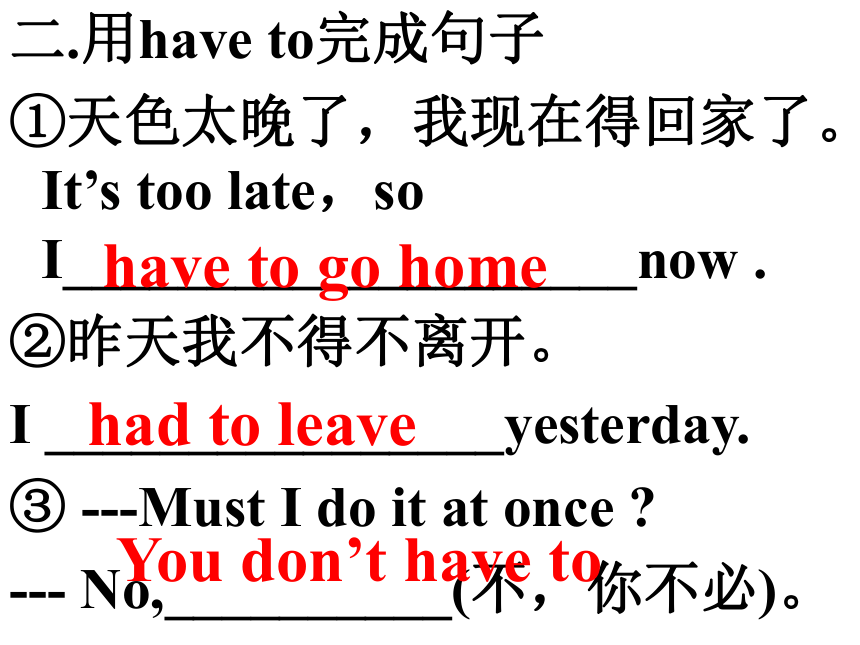
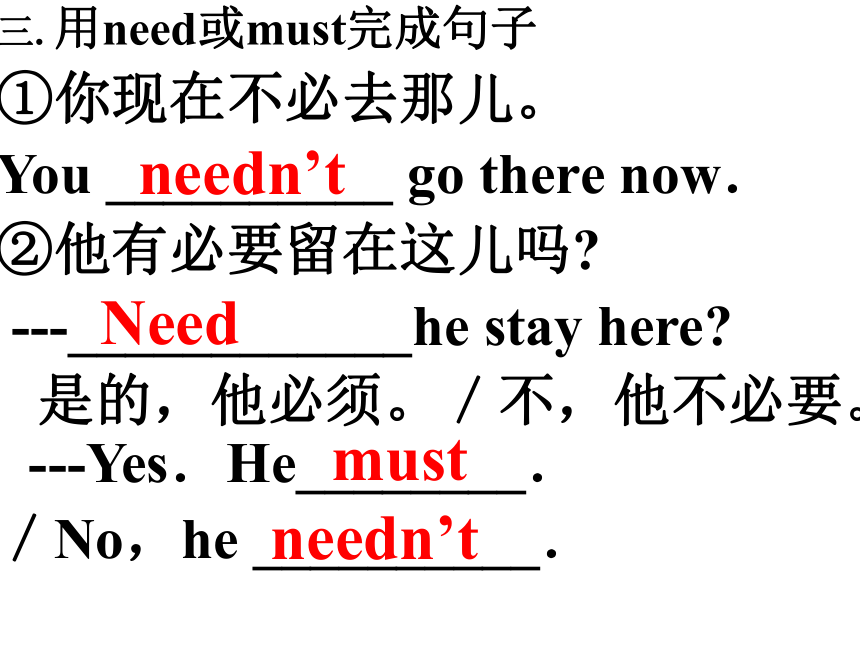

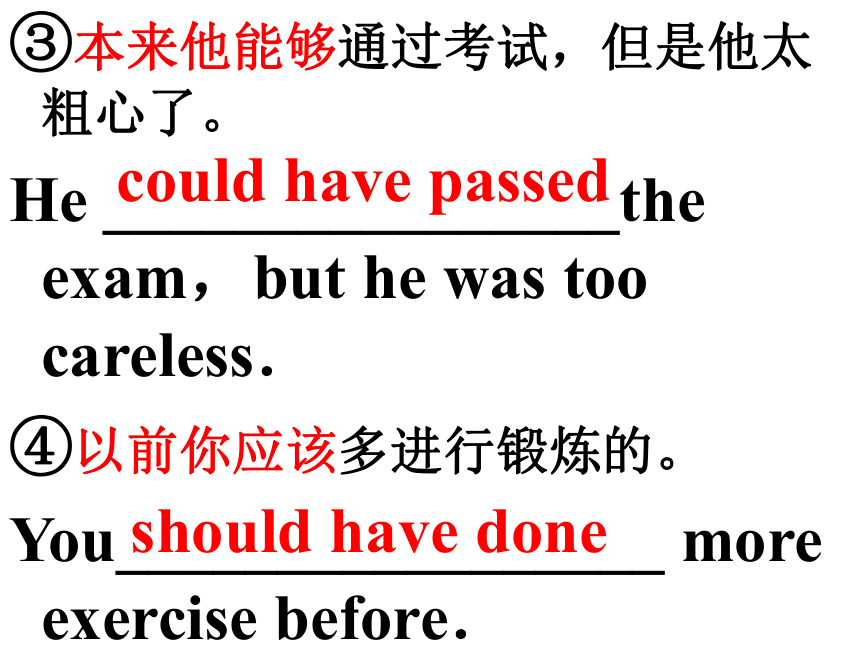
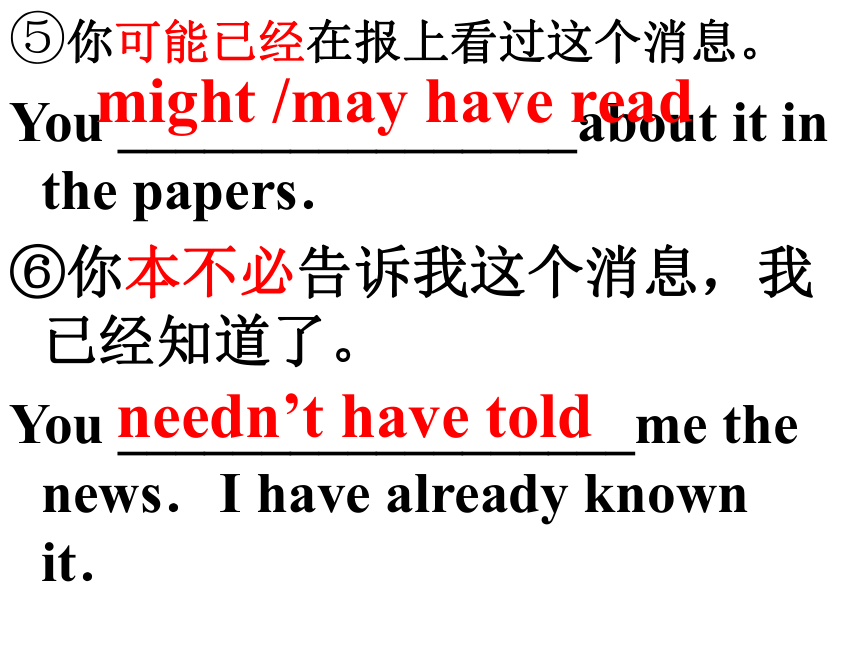
文档简介
(共32张PPT)
Period6
Grammar
Step1. Leading-in
Read and translate the following sentences together.
1.By now his restaurant ought to be full of people.
2.His mother is ill. He has to stay at home to look after her.
3.I must finish the work before Friday.
4.---Need I hand in the paper now?
---Yes, you must./No, you needn’t.
5.Something terrible must have happened if Li Chang was not coming to eat in his restaurant as he always did.
Step2 Thinking
1.Study the grammar by yourself.
2. Do the exercises.
Step3. Discussing
1. Discuss the answers to the exercises
2. Read the paper aloud.
Step4.Presenting
1. Present the answers on the blackboard.
2.Try your best to find out the mistakes.
二.用have to完成句子
①天色太晚了,我现在得回家了。It’s too late,so I____________________now .
②昨天我不得不离开。
I ________________yesterday.
③ ---Must I do it at once ?
--- No,__________(不,你不必)。 ____________________.
have to go home
had to leave
You don’t have to
三. 用need或must完成句子
①你现在不必去那儿。
You __________ go there now.
②他有必要留在这儿吗?
---____________he stay here?
是的,他必须。/不,他不必要。---Yes.He________.
/No,he __________.
needn’t
Need
must
needn’t
四. ① 你肯定看过电影《淘金热》。
You______________________ the film The Gold Rush.
② 史密斯先生不可能去北京了,我刚才还在图书馆看见他。
Mr. Smith__________________ to Beijing,for I saw him in the library just now.
must have seen
can’t have gone
③本来他能够通过考试,但是他太粗心了。
He ________________the exam,but he was too careless.
④以前你应该多进行锻炼的。
You_________________ more exercise before.
could have passed
should have done
⑤你可能已经在报上看过这个消息。
You ________________about it in the papers.
⑥你本不必告诉我这个消息,我已经知道了。
You __________________me the news.I have already known it.
might /may have read
needn’t have told
Step5. Analysing
ought to的用法:
1. ought to“应该”。与should相比较ought to语气重,偏重“责任、义务、道德、法律”等方面。
We ought to stop polluting nature.
我们应该停止污染大自然。
2. ought to表示较大的可能性。
Mary ought to be here soon.
玛丽应该很快就来了。
3. ought to的否定形式为
ought not to或oughtn’t to,
其一般疑问句形式是将ought置于主语前。
We ought not to start so late.
Ought he to see the doctor?
4. 在反义疑问句中,常省掉to用oughtn’t或shouldn’t。
He ought to take back what he has said,oughtn’t/shouldn’t he?
他应该收回他说的话,是吗?
二.have to,don’t have to与mustn’t的用法:
1.have to(口语中常用have got to)表示客观需要做的事情,意为“必须;不得不”。有时态、人称和数的变化,其否定式和疑问式应由助动词do构成。
My brother was very ill,so I had to call the doctor in the middle of the night.
我弟弟病了,我不得不半夜里把医生请来。
2.have to的否定式为don’t have to,表示“没有义务或没有必要做某事",意为“不必’,常可以回答must提问的一般疑问句。
You finish the work now.
你现在没有必要完成这项工作。
don’t have to
【辨析比较】must和have to
(1) have to侧重客观需要,而must表示说话人的主观看法;
(2) have to有时态、人称和数的变化,而must只有一种形式;
(3) must的否定式mustn’t表示“禁止"。
The magazines mustn’t be taken out of the reading room.
三、need的用法:
1.need作情态动词时,后跟动词原形,表示“需要;有必要”
You needn’t go there now.
你不必现在就去。
【点津】由need引出的一般疑问句的肯定回答常用must或have to,否定回答常用needn’t。
----Need I hand my paper right now?
--- Yes, you must./you have to.
/ No, you needn’t.
2.need作为实义动词时,同其他实义动词一样,可用于各种句式,有时态、人称、数的变化,构成否定句和疑问句时要借助于助动词do或does。
We don’t need to spend more time on it.
我们没有必要在这个事情上花太多的时间。
四情态动词+have done的用法
1.must have done用于肯定句,表示“过去一定做过某事”。
How can you be late again? You .
你怎么又迟到了?你一定是睡过头了。
must have overslept
2.can/could have done一般用于疑问句和否定句中,表示对过去所发生事情的推测。could have done用于肯定句时,表示“本有能力做某事而未做(虚拟)”。
翻译:
1. He can’t/couldn’t have watched TV last night,for he knew he would have a test.
昨天晚上他不可能看电视,因为他知道就要考试了。
2.We could have arrived there before dark,but we didn’t.
天黑前我们本来能够到那里的,但是没到。
(对过去的否定推测)
(与事实相反)
3. should have done 意为“本该做某事,但是没做成”,否定形式表示:“本不该做某事(但是却做了)”。
1)You should have told me earlier or I might have gone with them.
你应该早点告诉我,不然的话我就会和他们一块去了。
2.)You shouldn’t have let anyone else know the secret.
你本不应该让其他任何人知道这个秘密的。
3.)You should have done more exercise before.
以前你应该多锻炼身体。
4.may/might have done表示对过去发生的事情的推测,意为“也许已经做了某事,可能已经做了某事”
If you had studied hard,you might have passed the exam.
如果你好好学,也许就已经通过考试了。
You might have read about it in the paper.
你可能已经在报上看过这个消息了。
5.needn’t have done表示“本不必做某事而实际做了"。
It’s so near! We needn’t have taken a taxi.
这么近! 我们根本没有必要坐出租车。
You needn’t have told them about it.
你本来没有必要告诉他们那件事。
课堂检测答案:
1. have to should shouldn’t needn’t
don’t have to/needn’t/shouldn’t will
2. have to mustn’t
3. ought to should
Period6
Grammar
Step1. Leading-in
Read and translate the following sentences together.
1.By now his restaurant ought to be full of people.
2.His mother is ill. He has to stay at home to look after her.
3.I must finish the work before Friday.
4.---Need I hand in the paper now?
---Yes, you must./No, you needn’t.
5.Something terrible must have happened if Li Chang was not coming to eat in his restaurant as he always did.
Step2 Thinking
1.Study the grammar by yourself.
2. Do the exercises.
Step3. Discussing
1. Discuss the answers to the exercises
2. Read the paper aloud.
Step4.Presenting
1. Present the answers on the blackboard.
2.Try your best to find out the mistakes.
二.用have to完成句子
①天色太晚了,我现在得回家了。It’s too late,so I____________________now .
②昨天我不得不离开。
I ________________yesterday.
③ ---Must I do it at once ?
--- No,__________(不,你不必)。 ____________________.
have to go home
had to leave
You don’t have to
三. 用need或must完成句子
①你现在不必去那儿。
You __________ go there now.
②他有必要留在这儿吗?
---____________he stay here?
是的,他必须。/不,他不必要。---Yes.He________.
/No,he __________.
needn’t
Need
must
needn’t
四. ① 你肯定看过电影《淘金热》。
You______________________ the film The Gold Rush.
② 史密斯先生不可能去北京了,我刚才还在图书馆看见他。
Mr. Smith__________________ to Beijing,for I saw him in the library just now.
must have seen
can’t have gone
③本来他能够通过考试,但是他太粗心了。
He ________________the exam,but he was too careless.
④以前你应该多进行锻炼的。
You_________________ more exercise before.
could have passed
should have done
⑤你可能已经在报上看过这个消息。
You ________________about it in the papers.
⑥你本不必告诉我这个消息,我已经知道了。
You __________________me the news.I have already known it.
might /may have read
needn’t have told
Step5. Analysing
ought to的用法:
1. ought to“应该”。与should相比较ought to语气重,偏重“责任、义务、道德、法律”等方面。
We ought to stop polluting nature.
我们应该停止污染大自然。
2. ought to表示较大的可能性。
Mary ought to be here soon.
玛丽应该很快就来了。
3. ought to的否定形式为
ought not to或oughtn’t to,
其一般疑问句形式是将ought置于主语前。
We ought not to start so late.
Ought he to see the doctor?
4. 在反义疑问句中,常省掉to用oughtn’t或shouldn’t。
He ought to take back what he has said,oughtn’t/shouldn’t he?
他应该收回他说的话,是吗?
二.have to,don’t have to与mustn’t的用法:
1.have to(口语中常用have got to)表示客观需要做的事情,意为“必须;不得不”。有时态、人称和数的变化,其否定式和疑问式应由助动词do构成。
My brother was very ill,so I had to call the doctor in the middle of the night.
我弟弟病了,我不得不半夜里把医生请来。
2.have to的否定式为don’t have to,表示“没有义务或没有必要做某事",意为“不必’,常可以回答must提问的一般疑问句。
You finish the work now.
你现在没有必要完成这项工作。
don’t have to
【辨析比较】must和have to
(1) have to侧重客观需要,而must表示说话人的主观看法;
(2) have to有时态、人称和数的变化,而must只有一种形式;
(3) must的否定式mustn’t表示“禁止"。
The magazines mustn’t be taken out of the reading room.
三、need的用法:
1.need作情态动词时,后跟动词原形,表示“需要;有必要”
You needn’t go there now.
你不必现在就去。
【点津】由need引出的一般疑问句的肯定回答常用must或have to,否定回答常用needn’t。
----Need I hand my paper right now?
--- Yes, you must./you have to.
/ No, you needn’t.
2.need作为实义动词时,同其他实义动词一样,可用于各种句式,有时态、人称、数的变化,构成否定句和疑问句时要借助于助动词do或does。
We don’t need to spend more time on it.
我们没有必要在这个事情上花太多的时间。
四情态动词+have done的用法
1.must have done用于肯定句,表示“过去一定做过某事”。
How can you be late again? You .
你怎么又迟到了?你一定是睡过头了。
must have overslept
2.can/could have done一般用于疑问句和否定句中,表示对过去所发生事情的推测。could have done用于肯定句时,表示“本有能力做某事而未做(虚拟)”。
翻译:
1. He can’t/couldn’t have watched TV last night,for he knew he would have a test.
昨天晚上他不可能看电视,因为他知道就要考试了。
2.We could have arrived there before dark,but we didn’t.
天黑前我们本来能够到那里的,但是没到。
(对过去的否定推测)
(与事实相反)
3. should have done 意为“本该做某事,但是没做成”,否定形式表示:“本不该做某事(但是却做了)”。
1)You should have told me earlier or I might have gone with them.
你应该早点告诉我,不然的话我就会和他们一块去了。
2.)You shouldn’t have let anyone else know the secret.
你本不应该让其他任何人知道这个秘密的。
3.)You should have done more exercise before.
以前你应该多锻炼身体。
4.may/might have done表示对过去发生的事情的推测,意为“也许已经做了某事,可能已经做了某事”
If you had studied hard,you might have passed the exam.
如果你好好学,也许就已经通过考试了。
You might have read about it in the paper.
你可能已经在报上看过这个消息了。
5.needn’t have done表示“本不必做某事而实际做了"。
It’s so near! We needn’t have taken a taxi.
这么近! 我们根本没有必要坐出租车。
You needn’t have told them about it.
你本来没有必要告诉他们那件事。
课堂检测答案:
1. have to should shouldn’t needn’t
don’t have to/needn’t/shouldn’t will
2. have to mustn’t
3. ought to should
同课章节目录
